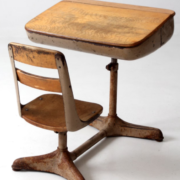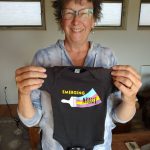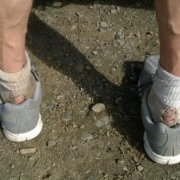Prayer, Anywhere
I was an outsider in my third grade classroom at Soquel Elementary School in 1963. It was not quite two years after the death of my father, and my mother simply couldn’t live anymore in the house he built us in Watsonville, 14 miles away. So here we were, new house, new town, new school, my little brother and I making our way when everything was darkly unfamiliar, like navigating a hotel room at 2 a.m. I was a lonely child, hoping to anchor myself in my new desk, lifting the lid and placing all my things carefully in rows as if I was planting a garden.
But I wasn’t completely alone, I knew, because I could pray. I could lift the wood top of my desk, and while bending my head to search for my math worksheets, I could say, as loud as I wanted inside my head, “Dear God, please help me not to cry when Mrs. Woolsey calls on me.” Because I cried often in those days.
It was but one year since the US Supreme Court ruled that prayer in public schools was unconstitutional. The court said it violated the Establishment Clause of the 1st Amendment, where we are protected from the government telling us which faith to cling to, if any faith at all.
I was certainly not a constitutional scholar, and the whole thing flummoxed me. People rose up in the pews of our evangelical church on Sundays to wail out prayers condemning the court. I didn’t understand their concern. A shy child like me never prayed out loud anyway. I prayed behind the lid of my desk top, I prayed behind the cafeteria door, I prayed in the corner of the school yard under the big oak at recess. Prayed that God would send a friend, bless my food, make things better at home. And no one had to know. It was between me and God.
I knew my Bible far better than my constitution. And I remembered Jesus’ words in Matthew 6:5: “And when thou prayest, thou shalt not be as the hypocrites are: for they love to pray standing in the synagogues and in the corners of the streets, that they may be seen of men. Verily I say unto you, They have their reward.”
My reward was something else entirely. If God had seemed abstract to me before, now his presence was real, touchable. He could have carved his name in that desktop next to the earlier occupents’: “Jesus is Here.”
My constant state of prayer set me in orbit outside the circle of my conservative church. I wondered why they were making God so small. I was troubled by my elders’ worries for the future of The Church. The Church was inside me, and no one could take it away.
Years later in a high school social studies class, I read constitutional co-author James Madison’s comment that Christianity “disavows a dependence on the powers of this world … for it is known that this Religion both existed and flourished, not only without the support of human laws, but in spite of every opposition from them.” I realized now that I wasn’t alone. Madison was my kind of guy, one who didn’t want to make God smaller still by building an earthly wall of law and edifice around him. Madison surmised God didn’t really needed laws to flourish, laws to hear and answer my prayers. Madison believed in an irreducible God, and so did I, at age eight and at age 13, and today, at 64.
This spring, I read of the group of churches who sued Oregon Governor Brown, claiming that her “stay home save lives” orders robbed them of their constitutional right to religion. Attorney Kevin Manix said the governor shouldn’t have uncontrolled power to shut down churches in Oregon. A judge in Baker County agreed with them, and voided the Governor’s orders. The State Supreme Court saw otherwise, and struck down the Baker County judge’s decision, leaving the governors orders – and her right to do what she deems best in the public interest – intact.
I was back in that third grade classroom, wondering why my betters said I had been robbed of prayer. I’m not sure how the churches in the lawsuit against the Governor are coping with COVID, but I know what my church is doing. Following the advice of Jesus in Matthew 18:20, “For where two or three are gathered together in My name, I am there in the midst of them” we simply changed “where” from our beautiful historic old church to the “where” of Zoom.
Yes, I miss the generations-old – almost audible – echos of baptisms, organ concerts, and Christmas plays in our sanctuary. Instead, I see the faces of my church family on Sunday, beaming at the holy electric connection we have together. I can welcome folks from afar … a dear friend who’s husband just died, and who could not be with us in body, but could join us in the spirit, complete with audio and video.
We add our written prayers in a sidebar chat area, and Pastor Vicky reads them aloud, and leads us in prayer. From her office, she breaks bread and sips juice on the screen while we break bread, and I for one, sip wine, from my kitchen table. We are as unbreakable a congregation as we have ever been, perhaps more so, as our experience of church transcends location to reside more fully in our hearts. A governor’s “stay home save lives” order did not shut down our church. Like a rained-out picnic, we simply moved the action indoors, to other chairs, perhaps in our pajamas.
I am sad for my litigious brothers and sisters in Christ because I think they have let the affairs of this world subsume their precious relationship to God, one that has endured centuries of war, famine, evil dictators and natural disasters. This is the church to which I am bound, and which no law can diminish.
June 13, 2020


 Two passions: food, words. Some days, it’s a tug of war, some days, a peaceful coexistence.
Best day ever? Create it, cook it, eat it, write about it. I sold my restaurant, Nora’s Table, in 2015, and now I can be possessed by anything in the long day that I choose: writing 400 words, creating the next menu for the Chefs Collective at Ruby June Inn, teaching a cooking class at Jacob Williams Winery, or tromping through the fields with farmer Laurel Bouret.
A rainy afternoon with a foundational cookbook, such as Marlene Mater’s fabulous “Allepo Cookbook” or Michael Ruhlman and Brian Polcyn’s “Charcuterie” can feed my spirit and spark my creative power. So can reading Maggie Shipstead, Michael Chabon or Alison Kraus.
I live in Hood River, Oregon, with Stuart, also known as the Happy Meal Man. In other words, all I can desire. And then there’s Satchel, our six-year old Idaho Shag who is simply the world’s best dog. We run together, and sometimes, we even let Stu join us.
Our oldest daughter Annie and grandson Levi live in Eugene, Oregon. Annie is cooking in restaurants, like her Mom. Son Max and his wife Hannah and our granddaughter Shiloh are in Portland, where he is a school principal. It’s a good tribe, all the way around.
Two passions: food, words. Some days, it’s a tug of war, some days, a peaceful coexistence.
Best day ever? Create it, cook it, eat it, write about it. I sold my restaurant, Nora’s Table, in 2015, and now I can be possessed by anything in the long day that I choose: writing 400 words, creating the next menu for the Chefs Collective at Ruby June Inn, teaching a cooking class at Jacob Williams Winery, or tromping through the fields with farmer Laurel Bouret.
A rainy afternoon with a foundational cookbook, such as Marlene Mater’s fabulous “Allepo Cookbook” or Michael Ruhlman and Brian Polcyn’s “Charcuterie” can feed my spirit and spark my creative power. So can reading Maggie Shipstead, Michael Chabon or Alison Kraus.
I live in Hood River, Oregon, with Stuart, also known as the Happy Meal Man. In other words, all I can desire. And then there’s Satchel, our six-year old Idaho Shag who is simply the world’s best dog. We run together, and sometimes, we even let Stu join us.
Our oldest daughter Annie and grandson Levi live in Eugene, Oregon. Annie is cooking in restaurants, like her Mom. Son Max and his wife Hannah and our granddaughter Shiloh are in Portland, where he is a school principal. It’s a good tribe, all the way around.
